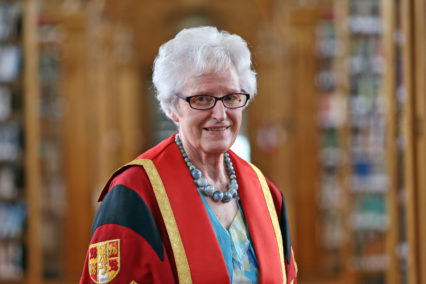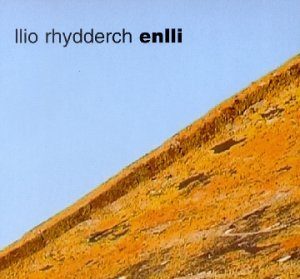In a new series for 2019, Wales Arts Review will be asking what are the greatest albums ever produced by Welsh musical artists? A wide selection of writers will be examining their favourites, and here Tomos Williams looks at the cult classic Enlli by Llio Rhydderch.

Llio Rhydderch’s Enlli appeared as a fully formed masterpiece on the independent Cardigan based fflach:tradd label, in 2003. It’s a statement of such beauty that it conjures reactions and emotions that are mystical, universal and transcendental. I’m no new-age hippy, but in order to try and convey the emotional quality of this music in words, one inevitably moves into the realms of the otherworldly.
Enlli (or Bardsey) is the small island off the most western point of the Llyn Peninsula which has had mystical and religious significance since the middle ages, inspiring numerous artistic statements in art, literature and music. The ‘triple harp’ – which is Llio’s instrument – originates in 16th Century Italy but has long been associated with Welsh traditional music. Its make-up is unique because it has three parallel rows of strings rather than the more common single row. The outside rows are tuned in unison, while the inside row can ring as sympathetic strings while also serving as ‘sharps or flats’.
Enlli was the first record by Llio that I heard, shortly after its release. I vaguely knew about the existence of a ‘triple harp’, but had never listened to one, and had not come across Llio Rhydderch either. I had recently joined the Welsh band Fernhill and both Ceri Rhys Matthews and Julie Murphy were bringing a lot of new music to my ears. They both told me to check out Llio’s new album, (Ceri is the producer of Enlli and all of Llio’s other albums).
The first hearing was astonishing. I had genuinely never heard anything quite like it and my life has never been quite the same. It was ancient and modern, abstract yet specific, universal yet somehow ‘Welsh’. The sound that Llio creates on the triple harp is unique and instantly recognizable. It captures the resonance and full breadth of the ‘tone’ of the note, while simultaneously being brittle and vulnerable. Her sound brings you in, rather than coming out at you.
The particularity and specificity of this music are difficult to define – it stems from the music but is also unique to each listener. Ceri Rhys Matthews grapples with this sensation in his sleeve notes:
…in an attempt to describe her work I suggested that her music takes you to your own special place and not hers – that it liberates rather than confines
…which is an accurate way of describing what happens when you listen to Enlli.
The music has emotion, gravitas, style, vulnerability and hidden strength. The lament and melancholy which the music appears to conjure are in no way self-pitying – in fact, the music is alive with hope and breaths of optimism. There is a dichotomy at the heart of the music: the happy and sad, the ancient and the modern, the melody and improvisation.
The album begins with ‘Enaid Enlli’ and ‘Clychau Clynnog’ (the spirit of Bardsey and The Bells of Clynnog) – two improvisational tour-de-forces. After stating the melody, Llio improvises on ‘the awen’ (the inspiration), as she ‘lets her fingers follow their own path’. This is a risky strategy predicated on the necessity of ‘inspiration’ coupled with complete commitment and courage (akin to Keith Jarrett’s celebrated piano improvisations).
In Western classical music, the ‘theme and variation’ model is a standard form, which has also been incorporated into Welsh (and many other) folk traditions. Llio takes this form a step further within the folk tradition, developing it into a ‘theme and open improvisation’. This is Llio’s specific and unique contribution to Welsh traditional music. She has established a distinct ‘oeuvre’ unique to her own recordings. She repeats this dance on a tightrope between melody and improvisation on her following releases (Gwenllian, 2009) and (Carn Ingli, 2012), but for me the level of inspiration, intimacy and expression reached on the Enlli performances verge on the ecstatic and remain unmatched.
Sonic variation and alternatives are not an option on a solo triple-harp album, but Llio is joined by a young pupil of hers, Elin Wyn Jones, on some tracks as they duet on ‘Malltraeth’, ‘Llwyn Onn’ and ‘Pen Rhaw’. Llio in her youth was a pupil of the pre-eminent triple harpist Nansi Richards, whom she toured and performed with, thus including duets with her own pupil allows Llio to pay homage to and continue this tradition. On Enlli Llio places herself firmly within the canon of traditional Welsh harp music, while simultaneously pushing the musical boundaries and frontiers of that same (inherently conservative) tradition.
Ceri Rhys Matthews (a formidable musician and traditional music excavator) should also take credit for producing and sustaining a consistent mood and atmosphere throughout the album. Many artists strike up career-defining relationships with their producers (Miles Davis and Teo Macero, Michael Jackson and Quincy Jones), I have no doubt that Ceri Rhys Matthews and Llio Rhydderch is an important musician/producer relationship that has left an indelible mark on Welsh traditional music and beyond. Ceri persuaded Llio to recorded her first album Telyn in 1997 followed by Melangell in 2000 (both on the fflach:tradd label). There were hints of brilliance to come on both recordings, but the songs were shorter and the choice of repertoire more conservative. Ceri allowed Llio space and encouraged her to forge her own path and follow her ‘awen’ (inspiration). The dovetailing of improvisation with melody matured into a unique form of expression on Enlli.
The commitment to both melody and improvisation – the known and the unknown – runs throughout the album. It is impossible at times to know whether Llio is deconstructing a melody or purely improvising. Snippets of ‘Ffynnon Melangell’ run throughout the album, little sketches of music almost serving as echoes of the grand improvisations contained within.
This is a world-class album recorded by a world-class musician. In a parallel universe Llio would be the Omara Portuondo of Wales, rightly celebrated in concert halls worldwide. Llio has harmonic sophistication comparable to Debussy or Bill Evans, she would not be out of place in the company of transcendental universal travellers such as Alice Coltrane or Rashid Ali, and her ‘authenticity’ is comparable to Blind Lemmon Jefferson or the Griots of Mali.
Enlli is an astonishing achievement.
DISCLAIMER: I’ve known Llio for almost 20 years – she toured Wales with my jazz/folk band Burum in 2008, we recorded a song for the Smithsonian Folklife collection in 2009 and we recorded a duo album together in 2012 (Carn Ingli). But rather than blinding my judgement, I think this gives me a privileged insiders angle on her music.
Enlli by Llio Rhydderch is available now.
Tomos Williams is a regular contributor to Wales Arts Review.
For other articles included in this collection, go here: The Greatest Welsh Album












